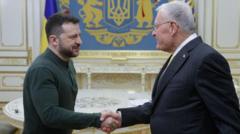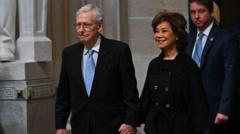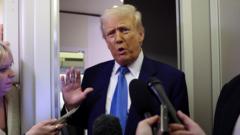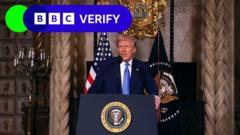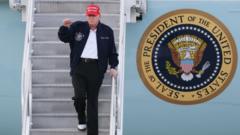The divergence of remarks from key officials raises questions about the consistency and clarity of America's stance toward Ukraine in the face of Russian aggression.
**Discordant Signals: U.S. Foreign Policy on Ukraine Worries European Allies**
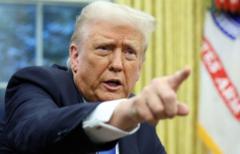
**Discordant Signals: U.S. Foreign Policy on Ukraine Worries European Allies**
Recent Ukraine-related statements from Trump's administration have left allied nations uneasy about U.S. foreign policy direction.
In a sequence of events that has sent shockwaves through Europe, discordant statements from officials within President Trump's administration regarding the ongoing war in Ukraine have led to heightened anxiety among U.S. allies. This concern largely stems from remarks made by Defense Secretary Pete Hegseth during the Munich Security Conference, where he outlined concessions that Ukraine might need to consider in negotiations with Russia—a position that diverges significantly from the traditional U.S. support for Ukraine.
Hegseth asserted that expectations of Ukraine reclaiming all occupied territories were "unrealistic" and suggested that NATO membership for Ukraine should be off the table. Such comments appeared to many as abandoning Ukraine's negotiating leverage and could be construed as a capitulation to Russian President Vladimir Putin. Critics, including Republican lawmakers, expressed alarm, likening Hegseth's approach to making major concessions before negotiations even commence and warning that it could weaken Ukraine's position.
Despite pushback, Hegseth later attempted to clarify that all options remained viable for future discussions, insisting he was merely expressing a "realistic" viewpoint. The fallout from his initial statements, however, continues to echo. As the administration grapples with its messaging on foreign policy, it seems inconsistent and confusing to observers; Trump's administration's reliance on internal loyalty over experience may contribute to this disarray.
Secretary of State Marco Rubio’s delayed arrival in Munich, due to mechanical issues, allowed for additional chaos, as Hegseth's comments overshadowed his own messaging focused on achieving a "just and lasting peace" led by European allies. Other administration figures, like Vice President JD Vance, further muddied the waters with contradictory remarks regarding military involvement, creating a patchwork narrative of U.S. intentions.
The mixed messages have not gone unnoticed in Europe. Officials are worried about the potential for a U.S.-brokered peace deal that might sideline Ukraine's interests. European foreign policy leaders are scheduled to engage in urgent discussions to ensure that their countries remain involved and unified in supporting Ukraine through the ongoing conflict.
As the Trump administration continues to confront complexities stemming from its approach to Ukraine, the implications of disconnected communication could undermine U.S. alliances and foreign policy credibility. In a rapidly evolving geopolitical landscape dominated by war, clarity and consistency will be critical in maintaining the trust of allies and adequately supporting Ukraine in its struggles against Russian advances. The uncertainties in Trump's strategy have raised concerns regarding the impact on U.S. influence and the future of peace negotiations in Ukraine.
Hegseth asserted that expectations of Ukraine reclaiming all occupied territories were "unrealistic" and suggested that NATO membership for Ukraine should be off the table. Such comments appeared to many as abandoning Ukraine's negotiating leverage and could be construed as a capitulation to Russian President Vladimir Putin. Critics, including Republican lawmakers, expressed alarm, likening Hegseth's approach to making major concessions before negotiations even commence and warning that it could weaken Ukraine's position.
Despite pushback, Hegseth later attempted to clarify that all options remained viable for future discussions, insisting he was merely expressing a "realistic" viewpoint. The fallout from his initial statements, however, continues to echo. As the administration grapples with its messaging on foreign policy, it seems inconsistent and confusing to observers; Trump's administration's reliance on internal loyalty over experience may contribute to this disarray.
Secretary of State Marco Rubio’s delayed arrival in Munich, due to mechanical issues, allowed for additional chaos, as Hegseth's comments overshadowed his own messaging focused on achieving a "just and lasting peace" led by European allies. Other administration figures, like Vice President JD Vance, further muddied the waters with contradictory remarks regarding military involvement, creating a patchwork narrative of U.S. intentions.
The mixed messages have not gone unnoticed in Europe. Officials are worried about the potential for a U.S.-brokered peace deal that might sideline Ukraine's interests. European foreign policy leaders are scheduled to engage in urgent discussions to ensure that their countries remain involved and unified in supporting Ukraine through the ongoing conflict.
As the Trump administration continues to confront complexities stemming from its approach to Ukraine, the implications of disconnected communication could undermine U.S. alliances and foreign policy credibility. In a rapidly evolving geopolitical landscape dominated by war, clarity and consistency will be critical in maintaining the trust of allies and adequately supporting Ukraine in its struggles against Russian advances. The uncertainties in Trump's strategy have raised concerns regarding the impact on U.S. influence and the future of peace negotiations in Ukraine.




